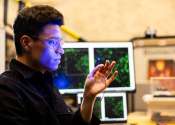Researchers identify origin and purpose of the facial expression for anger
The next time you get really mad, take a look in the mirror. See the lowered brow, the thinned lips and the flared nostrils? That's what social scientists call the "anger face," and it appears to be part of our basic biology ...
Aug 29, 2014
6
1







